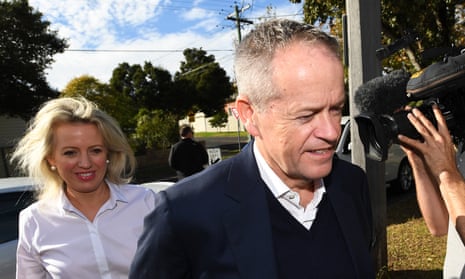The knives are out internally after Labor’s weekend election defeat, with widespread criticism of the performance of the party’s national secretary, Noah Carroll, including allegations he ignored negative messages about Labor’s policy agenda emanating from focus groups and wasn’t prepared to confront Bill Shorten to sharpen the campaign.
A number of Labor figures have told Guardian Australia they believe the combination of Shorten’s unpopularity and the party’s controversial tax agenda was lethal for its electoral prospects on Saturday night.
Some are critical of the lack of punchy fightback on Coalition scare campaigns about measures like dividend imputation, which was a significant problem for Labor in marginal seats, and about the advertising campaign, which was dwarfed by the spend by the controversial businessman Clive Palmer.
The Coalition determined at the start of the year it would use the budget to stabilise the government’s political fortunes, and use the April statement to set up its core campaign messaging on the economy and tax.
Liberal sources say the budget provided the conceptual starting point for the negative arguments the Coalition campaign constructed about Labor needing to raise more taxes in order to pay for big spending promises – a message Scott Morrison hammered both on the hustings and through advertising.
Senior figures say there was a mood in the electorate for change – but not necessarily a mood to change the government. Voters wanted a return to the more stable politics that existed pre-2007, after which point federal politics entered a decade of leadership instability.
With that nuance in mind, Morrison worked to paint Shorten and Labor as a risky rather than productive change, and excised himself from colleagues in order to keep the Coalition’s divisions largely out of public view.
With Labor figures shattered by the poor result, positioning for the party leadership under way now that Shorten has made it known he will exit the field and finger-pointing in advance of a campaign review, the ALP national president, Wayne Swan, issued a statement warning his colleagues to remain calm.
“The result is deeply disappointing and our party has a responsibility to analyse the result and to respond maturely,” Swan said on Sunday.
“Attributing blame or fault to any particular individual or policy is not the way ahead. Every political party which suffers a defeat learns one lesson and that is to listen even more carefully. In light of this result we need to examine our policy framework and our campaign strategies.”
During a brief public appearance on Saturday, Shorten, who has agreed to be Labor’s interim leader while the party makes a decision about the way forward, was asked what went wrong. “We didn’t get enough votes,” he said.
Shorten said he would convene the party’s national executive to begin the postmortem and the leadership ballot process.
Swan said Labor was “proud” of the role Shorten had played in “reuniting our party and refreshing our policy agenda, and I am pleased he will continue to serve in the parliament”.
“The party has got to dust itself off, rethink and reorganise”.
As well as the criticism of Shorten and key figures in the national secretariat, internally there is also backbiting about advice from veteran backroom operatives Peter Barron and Sharon McCrohan.
Barron, a stalwart of the right faction in New South Wales, is known as a veteran “fixer” in the party and was an adviser to both Bob Hawke and Neville Wran.
MPs in the wash-up on Sunday said the party had been over-ambitious in terms of a policy agenda and had poorly targeted key marginal seats. Many reported that basic infrastructure, such as signage and volunteers, were lacking from key pre-poll booths and across targeted marginal seats.
The ACTU’s “change the rules” campaign has also come under fire, with the secretary, Sally McManus, being compared unfavourably to former ACTU boss Greg Combet.
Some MPs also suggested that while decisions were made based on data, much of the information gathered was flawed, largely because of voter fatigue with information gathering by phone.
As many as 75,000 calls are estimated to have been made into key seats from both sides and third parties in the final week of the campaign.
